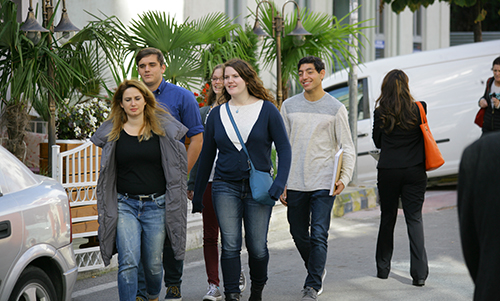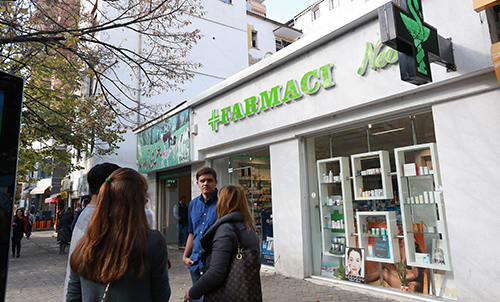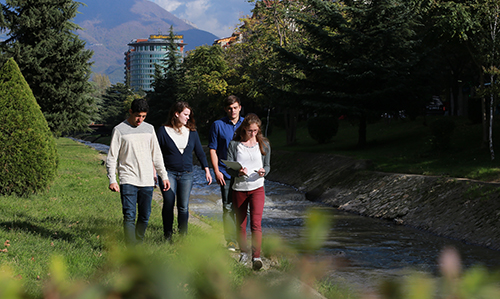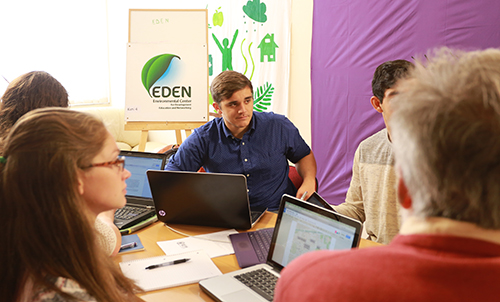Pharmaceuticals Project

WPI Albania Project Center: Shedding light on Pharmaceutical Waste Management in Albania
Student project aims to help pharmacists improve waste disposal practices

Visiting pharmacies in the city of Tirana
“On the ground” fieldwork is a major component of all projects at WPI, but for one student team who recently completed a project in Tirana, Albania, the phrase was particularly apropos.
Civil engineering major Samantha Eaton and chemical engineering majors Jason Bruno, Jeremy Heminway, and Elizabeth Towle spent the better part of seven weeks at WPI's Albania Project Center completing their Interactive Qualifying Project (IQP)—a project that requires teams to delve into a problem that matters to real people—walking from pharmacy to pharmacy in Tirana investigating pharmaceutical waste management practices in the capital city.
While the team had originally planned to visit just a few pharmacies, they ended up stopping at 74 of them, approximately 10 percent of the total pharmacies in Tirana.
Jonida Mamaj-Hafizi, project coordinator for the Environmental Center for Development Education and Networking (EDEN), the project’s sponsor, says that the assignment swiftly broadened once the students arrived in Albania.
- Jonida Mamaj-Hafizi, Project Sponsor
"In the beginning, when the students were still in America, we were thinking of addressing the problem in only two neighborhoods in Tirana," says Mamaj-Hafizi. "When they got to Albania, they were working every day and moving very fast, so we saw the possibility to cover all of the city."

A pharmacy along the streets of Tirana
The problem the project sought to address has an even wider scale, as pharmaceutical waste management is a growing issue throughout Albania, stemming from the recent massive expansion of the country’s pharmaceutical industry. As the students note in their project report, in the past two years, 671 new drugs have been registered with Albania’s Ministry of Health, nearly one drug for every day of the year.
When expired drugs are disposed of improperly, they can cause major hazards to human health and the environment if they enter the water supply. The government of Albania has instituted laws mandating proper disposal of drugs by requiring that pharmacies contract with waste management companies, but these laws are often not strictly followed or enforced.
The sponsor organization brought the WPI students on board to take a closer look at current pharmaceutical waste disposal practices and barriers to proper implementation. The students quickly discovered that the best way to gather this information was to go directly to the source by interviewing pharmacists, a method that proved to be both challenging and rewarding.

Student team inspecting water quality of the Lana River
“When we were first going into the pharmacies, we expected that we could perform the interviews in English, but when we got there we discovered that we could not, so we had to change that around a bit and adapt,” says Eaton. “Another obstacle was that the pharmacists were sometimes worried about disclosing information to us, because if they’re not following the regulations it can look bad. So we tried to find a way to convey that we weren’t trying to get them in trouble—we were trying to help them.”
Despite such impediments, the students found that many pharmacists were eager to share their experiences and concerns.
“A lot of pharmacies were very willing to talk to us because they realized that the system isn’t where they need it to be. Many feel a little bit hopeless, like there is no one to help them out,” says Bruno.
- Elizabeth Towle, Junior
Towle adds, "We were able to bring a 'the world is excited about this' factor where people start to take it seriously because they realize it's becoming a big issue. They don't have to feel like nothing is ever going to get done. This is becoming a global issue where people want to help them solve their problems."
Through their interviews, the team discovered that many pharmacists were uninformed or misinformed about laws governing waste management and believed that the small amounts of waste they produced individually were inconsequential.
In addition, more than half of the pharmacists with whom the team spoke indicated that they didn't have contracts with waste management companies, primarily because they didn't know how to contact them, couldn't afford their services, or didn't trust them.

A team meeting at EDEN, the sponsor's office
The students’ final report provided their sponsor with a detailed analysis of current pharmaceutical waste disposal practices and recommendations for moving forward. Most significantly, they noted that the most prevalent issue they found was a lack of information provided to pharmacists. As a simple remedy, they recommended the distribution of pamphlets outlining current waste management laws and treatment options, as well as the environmental impacts of improper waste disposal.
On a broader level, the students suggested that the government undertake more frequent visits to pharmacies and establish incentives for complying with waste disposal laws.
For her part, Mamaj-Hafizi plans to use the team’s findings as the base for additional projects that can reach diverse audiences throughout Albania.
- Jonida Mamaj-Hafizi, Project Sponsor
“After this study, we will address the problem through the government because they are the bodies that make the law and are responsible for it,” she says. “After that we want to draft a project in the community. We realize that a lot of people don’t know and don’t have information about this problem, so we want to make them act.”
While these projects are still in the planning stages, Mamaj-Hafizi hopes WPI will continue to be involved with them. She says she was particularly impressed with the efforts made by the students to understand and adapt to their new surroundings.
“I was skeptical in the beginning because we are living in different cultures, but I can say I was very happy with them,” says Mamaj-Hafizi. "The team wanted to be part of EDEN; they also were very interested to learn about Albania, and to understand all the perceptions of the people here. We hope to have more collaboration with WPI students throughout the years."
- Jonida Mamaj-Hafizi, Project Sponsor